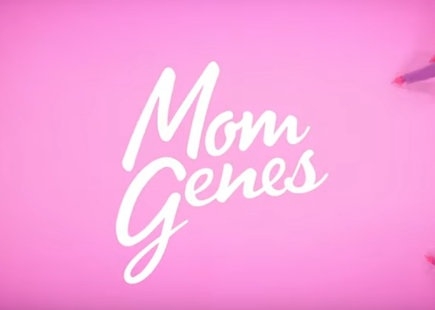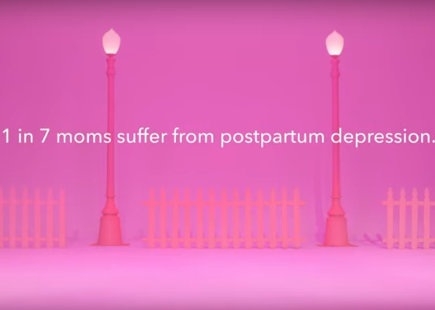MomGenes: New research suggests genetics has a significant impact on postnatal depression

Postpartum depression (PPD) is the number one cause of maternal mortality from suicide, with one in seven mothers affected by this condition.
The University of North Carolina at Chapel Hill (UNC) announces the completion of a study that confirmed direct genetic correlations associated with PPD (postpartum depression) and other psychiatric conditions.
Published in the American Journal of Psychiatry, the UNC research reveals that approximately 14 percent of the variance observed in PPD cases can be attributed to common genetic factors. The study underscores the substantial genetic underpinning of PPD susceptibility, challenging previous notions primarily linked to environmental factors.
The completion of this study was made possible through the DNA submissions driven by the Mom Genes Fight PPD campaign, developed by creative agency, WongDoody.
The pro-bono campaign launched in early 2020 facilitated the participation of thousands of mothers, either experiencing or having previously experienced symptoms of PPD.
Through a fully custom-designed Apple Research app, Mom Genes Fight PPD, women were encouraged to engage in a brief and validated clinical assessment to determine their eligibility for the study. Those meeting the inclusion criteria and consenting to participate received a “spit kit” delivered via mail, simplifying the process and enhancing accessibility with included prepaid postage.
In addition to the app, social media community, and a MomGenesFightPPD mom-fluencer event in Los Angeles, the team at WongDoody produced a powerful video that provides a visceral look at the invasive thoughts that PPD can illicit. The video was shared thousands of times and was flooded with comments of women feeling “seen.”






The campaign's impact extended beyond participation, with women nationwide, including influential figures like Alanis Morissette and Catherine Reitman from the Netflix series "Workin’ Moms," sharing their compelling stories and support using #MomGenesFightPPD. These personal narratives not only contributed to the research effort but also worked to destigmatize PPD, offering support to those affected by the silent disease.
One participant from the Mom Genes study drew on her own experience, “I didn’t seek treatment and was never formally diagnosed after my first child was born. It placed an enormous strain on my personal and professional relationships. I donated my Mom Genes in the hopes that no woman, especially my own daughter, will have to suffer with PPD.”
Dr. Samantha Meltzer-Brody, co-principal investigator of the study, emphasized the critical role of the "Mom Genes Fight PPD" campaign in reaching the necessary DNA submissions to facilitate the research.
Led by Jerry Guintivano, PhD, the research revealed the genetic architecture of PPD, establishing correlations with major depression, bipolar disorder, anxiety disorders, posttraumatic stress disorder, insomnia, and polycystic ovary syndrome. It was found that PPD's genetic factors intersect with those involved in various psychiatric and hormone-related conditions.
Moreover, the researchers identified genetic regions associated with GABAergic neurons in the thalamus and hypothalamus, highlighting their link to PPD. Its findings suggest that brexanolone, the sole FDA-approved treatment for PPD, acts on these GABAergic neurons in specific brain regions, shedding light on its effective mechanism of action.
The creation and advocacy of the "Mom Genes Fight PPD" campaign were
undertaken by WongDoody, furthering our understanding of the heritability of PPD and
advancing avenues for effective treatment.
Jennie Moore, group creative director - North America, WongDoody, commented, “Working with UNC Chapel Hill to create Mom Genes was both an honour and an incredible opportunity. It’s not every day we get the chance to help affect change on a generational level, and we’re endlessly grateful to the brave moms who donated their DNA and the researchers who made the discoveries. Through our combined efforts, a future without PPD feels closer than ever.”
Credits
Creative Agency: WongDoody
Chief Creative Officer: Tracy Wong
Group Creative Director: Matt Burgess
Creative Director: Vanessa Witter
Senior Art Director: Amy Matheu
Copywriter: Eric Hammond
Executive Producer: Matteo Mosterts
Associate Content Producer: Ailbhe Fitzpatrick
Group Account Director: Kinley Lagrange
Account Director: Erin Mulhern
Assistant Account Executive: Savannah Krager
CEO: Ben Wiener
President: Skyler Mattson
Production Company: Community Films
Director: Pam Thomas
EP: Lizzie Schwartz
Line Producer: Anthony Cantale
Choreographer: Charlene “Chi Chi” Smith
Music House: Massive Music Producer: Dale Mason
Creative Director: Ben Einziger
Composer/Rearrangement by: Patrick McArthur and Ben Einziger
Lead Vocalist: Ailbhe Fitzpatrick
Backing Vocals: Amy Matheu and Chantel Whittle
Original Track: “I Love My Girl” by the Hilltoppers
Editorial: Arcade Edit
Editor: Sean Lagrange
Executive Producer, L.A.: Crissy DeSimone
If you enjoyed this article, you can subscribe for free to our weekly email alert and receive a regular curation of the best creative campaigns by creatives themselves.
Published on:




